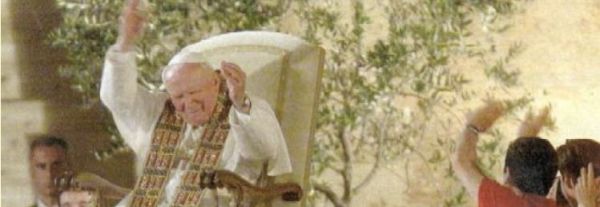3. In what does faith consist? The Constitution Dei Verbum explains that by faith, "man freely commits his entire self to God, making 'the full submission of his intellect and will to God who reveals'" (n. 5). Thus faith is not only the intellect's adherence to the truth revealed, but also a submission of the will and a gift of self to God revealing himself. It is a stance that involves one's entire existence.
The Council also recalls that this faith requires "the grace of God to move [man] and assist him; he must have the interior helps of the Holy Spirit, who moves the heart and converts it to God, who opens the eyes of the mind and 'makes it easy for all to accept and believe the truth'" (ibid.). In this way we can see how, on the one hand, faith enables us to welcome the truth contained in Revelation and proposed by the Magisterium of those who, as Pastors of God's People, have received a "sure charism of truth" (Dei Verbum, n. 8). On the other hand, faith also spurs us to true and deep consistency, which must be expressed in all aspects of a life modeled on that of Christ.
4. As a fruit of grace, faith exercises an influence on events. This is wonderfully seen in the exemplary case of the Blessed Virgin. Her faith-filled acceptance of the angel's message at the Annunciation is decisive for Jesus' very coming into the world. Mary is the Mother of Christ because she first believed in him.
At the wedding feast in Cana, Mary, obtains the miracle through her faith. Despite Jesus' reply, which does not seem very favourable, she keeps her trustful attitude, thus becoming a model of the bold and constant faith which overcomes obstacles.
The faith of the Caananite woman was also bold and insistent. Jesus countered this woman, who had come to seek the cure of her daughter, with the Father's plan which restricted his mission to the lost sheep of the house of Israel. The Caananite replied with the full force of her faith and obtained the miracle: "O woman! Great is your faith! Be it done for you as you desire" (Mt 15:28).
5. In many other cases the Gospel witnesses to the power of faith. Jesus expresses his admiration for the centurion's faith: "Truly, I say to you, not even in Israel have I found such faith" (Mt 8:10). And to Bartimaeus: "Go your way your faith has made you well" (Mk 10:52). He says the same thing to the woman with a haemorrhage (cf. Mk 5:34).
His words to the father of the epileptic who wanted his son to be cured are no less striking: "All things are possible to him who believes" (Mk 9:23).
The role of faith is to co-operate with this omnipotence. Jesus asks for this co-operation to the point that upon returning to Nazareth, he works almost no miracles because the inhabitants of his village did not believe in him (cf. Mk 6:5-6). For Jesus, faith has a decisive importance for the purposes of salvation.
St Paul will develop Christ's teaching when, in conflict with those who wished to base the hope of salvation on observance of the Jewish law, he forcefully affirms that faith in Christ is the only source of salvation: "We hold that a man is justified by faith apart from works of law" (Rom 3:28). However, it must not be forgotten that St Paul was thinking of that authentic and full faith which "works through love" (Gal 5:6). True faith is animated by love of God, which is inseparable from love for our brothers and sisters.
[Pope John Paul II, General Audience 18 March 1998]












